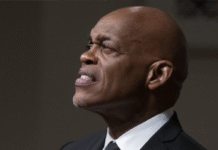

When Canadian actor Stephan James traveled to Berlin, he walked alone into the same arena where groundbreaking athlete Jesse Owens (1913-1980) won four gold medals in front of 150,000 spectators at the 1936 Olympics. Walking on those same grounds close to eight decades later inspired James to believe he was part of a significant moment immortalizing an American icon.
The 22-year-old leading man is starring in Race, a two-plus hour period piece that retells the sequence of events surrounding the record-breaking track-and-field sprinter triumphing under Hitler’s regime. “I realized I was in a different space,” recalls James seated at a roundtable at the Ritz-Carlton Hotel in downtown Atlanta. “I just remember having chills. You can only imagine Jesse’s mindset and the type of place he was in. It was a real moment that I was really able to lock in and feel what he felt.”
James’ transformation into the Alabama native who became the first American in history to earn four gold medals in a single year was comprised of a combination of meticulous research and detail-oriented physical acting. Born in Toronto, James closely studied Owens’ form. He shaved his hairline to resemble Owens’ hairline. The extremely toned performer trained on Georgia Tech’s campus two months prior to going into production under the tutelage of Tech’s assistant track-and-field coach, Nat Page. James, an exceptional basketball and volleyball player, admits to barely knowing anything about sprinting.
Speaking in a soothing, deep voice and back to wearing his original hairline, James, who celebrated his 22nd birthday two days prior, drew parallels between his sportsmanship and passion for acting. “It was all about focus and discipline,” urges James. “That same dedication I had for sports can easily transcend to the acting world: paying attention to how [Jesse] started his race, what were his stride and posture like and what was his face looking like. Paying attention to small details is something athletes do all the time.”
Researching Owens through literature and archives netted minimal results for James. He used those limited reference materials he found via the internet and married that information with anecdotes he gathered from being around Owens’ three daughters. “It was very helpful to me,” continues James. “They’re very involved in the whole scriptwriting process and filming. They filled in the blanks as far as their father was concerned.”
No stranger to performing in historical dramas, James is comfortable with accepting roles that allow him to identify with the plight of past generations of black and brown people. The Canadian Screen Award nominee portrayed a young Congressman John Lewis in the civil rights-era blockbuster, Selma, while he was conditioning for Race. James was also cast in The Book of Negroes, The L.A. Complex and Degrassi: The Next Generation.
“Acting is something that I just love to do,” confirms James, adding on that he’s a voracious reader as it relates to sports and politics. “For me to be able to do that, I have to be as focused as Jesse Owens was.”
James is especially proud of being selected as one of Toronto International Film Festival’s Rising Stars last year. The recognition put the young actor in similar spaces as numerous casting directors and producers. “That was a very special moment for me,” the gracious actor says. “Having that sort of honor from my own city is incredible. That’s something a lot of actors don’t get, having those types of influential people in front of them. That was a very important opportunity for me.”
Reiterating how fortunate he’s been to work on great projects, a mild-mannered yet confident James refuses to typecast his acting ability to strictly portraying historical figures. “I look forward to doing many different types of roles and exploring many different genres,” confirms James. “This is not it.”
James reiterates that possessing a flawless work ethic is how he lands roles. His skin color, he says, doesn’t diminish his potential. “Obviously we see that usually minorities aren’t equally represented in certain instances,” states James, “but for me, it’s always been a journey of working hard, focusing and not using that as a crutch or an excuse for anything.”
James adds, “When you’re telling a story like this, you have a responsibility to answer questions. Race shows how far we’ve come and why we can’t afford to take any steps backwards. I’m not a politician, but I’m not afraid of those questions.”
As James’ star continues to rise in cinema, he says no role he’s played thus far has been as challenging as Race. The influx of 16-hours days he spent on-set for a three-month shoot became taxing. James insists that stepping into the role of Jesse Owens is both physically and mentally demanding. “When you’re in a space where you’re only being another person,” says James, “you’re not yourself. You give so much of yourself to that person.”
Still, James is proud to have portrayed another iconic subject, even pointing out how surprised he was that Germans adore the Presidential Medal of Freedom recipient’s legacy. “I really just hope that people are inspired by a man who is not only an American hero but a world hero,” says James. “He’s someone who’s broken so many barriers with just his talent, love, passion and dedication. If Jesse could do what he did in the time in which he did it, then there’s no excuse for us. The sky’s the limit.”
This post was written by Christopher A. Daniel, pop cultural critic and music editor for the Burton Wire. He is also contributing writer for Urban Lux Magazine and Blues & Soul Magazine. Follow Christopher @Journalistorian on Twitter.
Follow the Burton Wire on Twitter @TheBurtonWire or Instagram.







